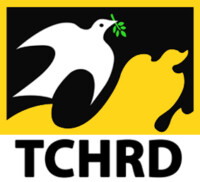Five Serwa monks, all from Chamdo Prefecture, are presently serving sentences of 12 to 15 years for pasting posters and shouting slogans calling for an independent Tibet and the long life of the Dalai Lama. They have been tortured and used as public examples of what can happen to those who disagree with Chinese policy.
Chime Dorje, now 29 years old, is from Serwa village in Joju sub-county, under Pasho County in Chamdo Prefecture. His father, Phuntsok Wangdu, and older brother, Norbu, are both farmers and his mother has passed away.
Pema Tsering, now 25, is from Gyabdo village in Joju, Pasho, in Chamdo. His father, Jampal, is the head of the Gyabdo village.
Lobsang Tsegyal (sometimes called Lobsang Khyi-kyag) 29, is from Serwa village. His father, Dham Namgyal and his mother, Dechen Sangmo, are both farmers.
Jampa Tashi, aged 28, is from Gyabdo village. His father, Lobsang Yarphel, and his mother, both farmers, are now deceased.
Lobsang Palden, aged 26 today, is from Serwa village. His father, named Ngawang Tobden, is a farmer and his mother, named Sonam Wangmo, has passed away. His older brother, Lobsang Tenzin, is a teacher at the Serwa village school.
All five men were farmers before joining Serwa Monastery.
At around midnight on 29 March 1994, the five monks went to the headquarters of the Lingkha District People’s Government in Pasho County. From the main gates of the headquarters, they removed the two nameplates which read “Party People’s Government” and “District People’s Government”. The monks broke the first nameplate into pieces and threw it to the ground and replaced the second nameplate upside down.
On the walls of the building the monks pasted posters reading “May His Holiness the Dalai Lama Live for Ten Thousand Years” and “Tibet is an Independent Country”. At the bottom of the posters the monks put their names, thumb impressions and wrote, “We are from Serwa Monastery”.
As the five were walking from Lingkha district to Pasho County they met Lobsang, the Party Secretary of Lingkha district. They demanded that he drive them to the county headquarters where they planned to stage a demonstration.
On their way to the County Headquarter the monks put up posters on the walls of government and military offices and shouted slogans, calling again for independence and the long life of the Dalai Lama.
The five monks were then driven directly into the compound of the County Public Security Bureau (PSB) where a number of policeman were called in to take the monks into custody. In order to make a public example of them, the five monks were then each tied by one thumb and kept in aerial suspension at the PSB gate.
Later, during interrogation, when the police demanded to know who among them led the shouting, all five shouted in unison to claim the responsibility for himself. All five were then severely beaten and it was reported that their faces were afterwards full of open wounds and that a pool of blood had formed on the floor of the interrogation room. After five days the monks were handed over to the Chamdo Prefectural PSB.
When relatives and friends went to Chamdo to take tea and butter to the monks the police told them, “There is no reason why these mad rebels against the Communist Party of China, would need these gifts. Yes, we allow murderers to be visited in prison. But these are opponents of the Communist Party of China.” The visitors were sent away with their gifts without being allowed to see the monks.
Around 10 May 1994, the five were handed over to the PSB of Pasho County. The Pasho PSB questioned Lobsang Palden’s brother, Sangpo Tenzin and Chime Dorje’s brother, Norbu as to who had told them that Tibet is an independent country. Sangpo and Norbu replied that they had learnt it through the Tibetan language service of the VOA broadcasts. This angered Pasho police who severely beat the two monks.
The Pasho PSB afterwards visited Serwa Monastery where they announced, “The Serwa Monastery has since 1959 always been stirring up disturbances. That is why we never provided it with facilities for rebuilding and renovation. … Right now those who say they will win Tibet’s independence are wearing iron shackles on their feet and wrists, sitting on cold cemented floor.”
On 6 July 1994 a public meeting was held at which the decision of the Chamdo Intermediate People’s Court regarding the five Serwa monks was announced. They had allegedly been found guilty of “counter-revolutionary” crimes on clear and proven evidence in accordance with the relevant provisions of the PRC’s Penal Code and Criminal Procedure Code”.
Chime Dorje, Lobsang Tsegyal and Pema Tsering were sentenced to 15 years imprisonment with deprivation of political rights for a further five years. Lobsang Palden and Jampa Tashi were sentenced to twelve years with deprivation of political rights for four years.
The television broadcast of the sentences stated that the five had allegedly put up posters “with the aim of splitting the motherland” and had defaced government nameplates “to indicate that they were overthrowing the township people’s government.” The broadcast described the verdict as a “signal to anyone who would undermine Tibet’s stability or its allegiance to Beijing.”
